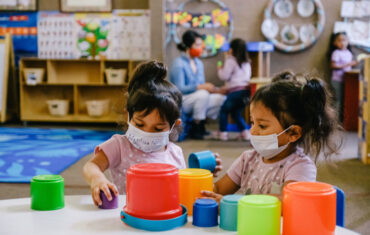Wearing a face mask in public has been highly encouraged by government officials. A recent study from Hong Kong found that wearing face masks can reduce the non-contact transmission of COVID-19 virus.
Who should not wear face covering?
There are certain groups of people that should not wear a face mask. The CDC says that children under the age of 2-years-old should not wear cloth face masks. The CDC website writes, “Young children under age 2 should not wear cloth face cover. Anyone who has trouble breathing, or is unconscious, incapacitated or otherwise unable to remove the mask without assistance.” But medical experts say most of those people probably shouldn’t be out in public anyway. Doctors say people with neurodevelopmental disorders, like autism, can experience intense anxiety when forced to wear face masks. However, that it can be overcome through practice, mask modifications and therapy.
But here’s where it gets tricky:
None of the health agencies specify any health conditions that would constitute a mask exemption. And some health professionals don’t believe these stated, unspecific exemptions for surgical masks or cloth face cover are necessary.
“Finding a mask that fits well or a face cover with a fabric that is soft will help you stay comfortable while you help keep your family, friends, neighbors, and community safe from COVID-19 and other contagious diseases,” says Dr. Kaufman, MD, pulmonologist and director of the medical ICU at Tisch Hospital. And if you can’t find a face mask that feels comfortable, Doctor suggests a using a face shield that drops down below the level of the chin as an alternative.
Who needs to wear face masks?
The CDC, “recommends that people wear cloth face cover in public settings when around people outside of their household. Especially when other social distancing measures are difficult to maintain.”
The World Health Organization (WHO) takes things a step further with recommendations that differ between who should wear surgical or medical face masks and who should wear cloth face cover. (Note: Both the CDC and WHO still only recommend N95 respirator masks for health care personnel who need protection from both airborne and fluid hazards):
Surgical or medical face masks are for:
- Health care workers
- People with COVID-19 symptoms
- Anyone taking care of someone with suspected or confirmed COVID-19
- People who are 60 years old or older (when social distancing isn’t possible in areas with widespread COVID-19)
- People who have underlying health conditions (when social distancing isn’t possible in areas with widespread COVID-19)
Cloth face coverings or fabric masks are for everyone when:
- COVID-19 is widespread
- Physical distancing of at least 1 meter (3 feet) isn’t possible (including on public transportation, workplaces, stores, and other crowded environments)
It’s more important to worry about how to wear a face mask, rather than who may or may not have to. Most people need education on proper use rather than exemption from such a simple and effective device to keep them and others safe






